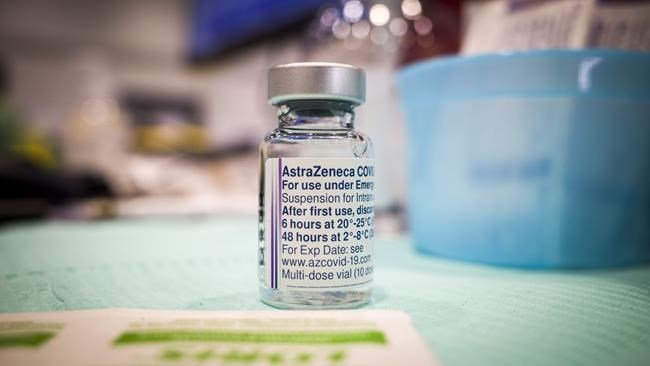TORONTO — Health Canada extended the expiry date of tens of thousands of Oxford-AstraZeneca COVID-19 vaccine doses by one month on Saturday, easing pressure on Canadians scrambling to get a second shot before the jabs went to waste.
That was most dramatically illustrated in Ontario, where pharmacists and physicians planned to work through the weekend to use up 45,000 shots expiring on May 31 and 10,000 more with a best-before date in June. Any injections formerly set to expire on Monday can now be used until July 1, according to Health Canada's new guidance.
The government department stressed that the move is supported by ample scientific evidence. A Saturday statement said Health Canada received an application directly from AstraZeneca complete with "product stability and mathematical modelling data" showing that two lots totaling 49,000 shots could be safely and effectively used over seven months rather than the original shelf life of six.
"This change will ensure that provinces and territories are able to use up their existing inventory and provide Canadians access to much needed doses of the vaccine," Health Canada said in a statement.
The head of the Ontario Pharmacists Association said Health Canada's decision is not unprecedented when it comes to evolving data associated with a new vaccine.
"It's good news," Justin Bates said. "Although I do appreciate this is going to create a lot more questions ... so people can continue to make an informed consent decision."
Canada's rollout of the AstraZeneca vaccine has been plagued by controversy and mixed-messaging.
Some provinces have paused their use of the vaccine over supply issues and concerns around a rare but deadly blood clotting disorder linked to the shots.
There had been just over two dozen confirmed cases of vaccine-induced immune thrombotic thrombocytopenia, also known as VITT, in Canada as of Thursday, with another 14 under investigation.
Five people had died of the condition, the Public Health Agency of Canada said.
Ontario resumed the use of the AstraZeneca vaccine for second doses this past week, citing evidence that the likelihood of developing the condition is even lower after the follow-up shot than it is after the first injection.
The province has begun administering second shots to people who received their first dose between March 10 and 19 at pharmacies in Toronto, Windsor and Kingston, as well as some family doctors' offices.
News of the extended expiry dates came as COVID-19 cases across Canada continued to climb, albeit at a slower rate than during the height of the pandemic's third wave.
Alberta announced 406 new cases of COVID-19 on Saturday and eight added deaths.
That province also announced that there were fewer than 500 COVID-19 patients in hospital, which Premier Jason Kenney hailed as a sign of success.
He said that if the relatively low hospitalization rate holds, Alberta will move to the next stage of its reopening plan.
"As long as hospitalizations stay below 500, we will move into Stage 2 on June 10 and be one step closer to having an amazing and fully open Alberta summer," Kenney said in a news release.
That stage would see the province allow outdoor gatherings of up to 20 people, with physical distancing in place. It would also allow restaurants to reopen for both indoor and outdoor service, with up to six people from the same household at a table.
Meanwhile, Saskatchewan counted 179 new cases of the virus and one more death, while hard-hit Manitoba reported 357 new cases of COVID-19 and three added deaths.
Ontario recorded 1,057 new cases of the virus, as well as 15 more deaths.
Quebec, meanwhile, diagnosed 410 new COVID-19 cases and reported seven virus-related deaths.
The numbers came a day after the province lifted the nighttime curfew it originally imposed in January when daily infection rates were on the rise. The province's restaurants were also cleared to resume outdoor dining as of Friday.
Farther east, New Brunswick counted 10 new cases of COVID-19 and Nova Scotia logged 33, plus four added deaths.
Newfoundland and Labrador reported nine new confirmed cases of the virus.
This report by The Canadian Press was first published May 29, 2021.
— With files from Shawn Jeffords in Toronto and Virginie Ann in Montreal
Nicole Thompson, The Canadian Press



